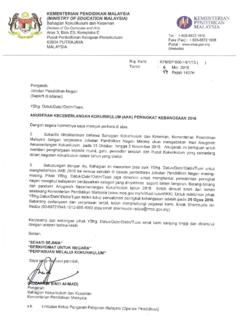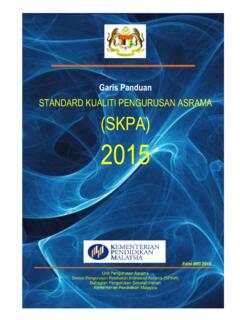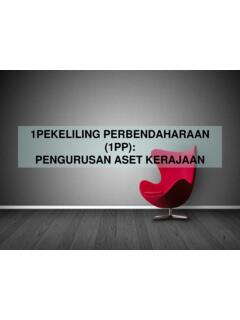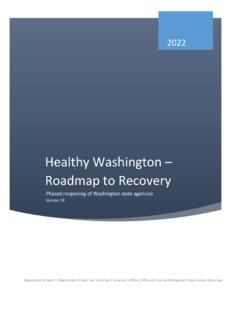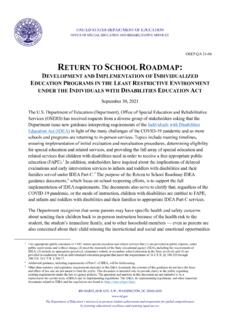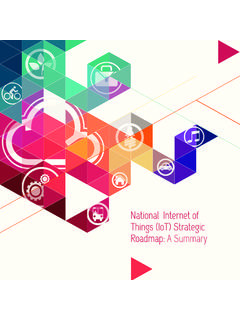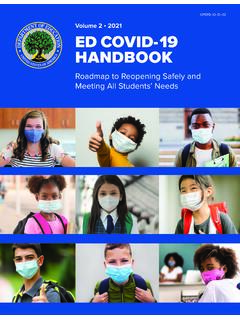Transcription of MALAYSIA’S ROADMAP TOWARDS ZERO SINGLE-USE …
1 MALAYSIA S ROADMAPTOWARDS ZEROSINGLE-USE PLASTICS2018-2030 TOWARDS a sustainable futureThis publication may be reproduced in whole or in part and in any form for educational or non-profit purposes without special permission from the Ministry of Energy, Science, technology , Environment & Climate Change (MESTECC), provided acknowledgement of the source is made. MESTECC would appreciate receiving a copy of any publication that uses this publication as a source. No use of this publication may be made for resale or for any other commercial purpose whatsoever without prior permission in writing from MESTECC.
2 Published in 2018 byMINISTRY OF ENERGY, SCIENCE, technology , ENVIRONMENT & CLIMATE CHANGE (MESTECC), MALAYSIAL evel 1-7, Block C4 & C5, Complex C,Federal Government Administrative Centre, 62662, Putrajaya, S ROADMAPTOWARDS ZEROSINGLE-USE PLASTICS2018-2030 TOWARDS a sustainable futureROADMAP TOWARDS ZERO SINGLE-USE PLASTICS 2018-2030 INTRODUCTION Since the 1950s, the production of plastic has outpaced that of almost every other material due to its versatility and functionality. Most of these plastics are designed to be thrown away after being used only once ( SINGLE-USE ) which results in SINGLE-USE disposable plastics waste accumulation.
3 Only nine per cent of the nine billion tonnes of plastic the world has ever produced has been recycled. Most ends up in landfills, dumps or in the open environment1. SINGLE-USE plastics2 are plastics that are commonly used for plastic packaging, carry bags and include items intended to be used only once before they are thrown is a global player in the plastic industry with currently about 1,300 plastic manufacturers. As of 2016, our exports amounted to RM30 billion which saw a million metric tonnes of resin utilised to produce plastics. Environmental problems related to plastic waste have become a major problem in Malaysia where it has been ranked as 8th among the top ten countries with mismanaged plastic waste in the world.
4 A study estimated that Malaysia had produced million tons of mismanaged plastic wastes, of which to million tons may have been washed into the oceans3. Some studies have also highlighted the potential health effects of SINGLE-USE plastics on human and animals. Besides that, the Asia Pacific Economic Cooperation (APEC) had estimated USD13 billion impact of marine plastic pollution to the Asia Pacific region4. More than 60 countries have introduced some measures to curb SINGLE-USE plastics waste such as imposing bans and levies. Some countries have imposed direct ban on SINGLE-USE plastics but according to a UNEP1 report, the bans have not been effective to curtail plastic pollution.
5 The report also highlights other countries have taken a phased approach and in some cases, complimented with economic instruments. For example, India is planning to phase-out SINGLE-USE plastics by 2022. Taiwan and European Union plan to phase-out SINGLE-USE plastics by pollution is a global problem that needs to be addressed in a sustainable manner. Malaysia has always promoted sustainable development by balancing economic growth with environmental protection in line with the United Nation s Sustainable Development Goals. Malaysia plans to address SINGLE-USE plastics by encouraging the plastic industry to transition to eco-friendly products.
6 This will ensure the industry thrives by adapting green technologies while the environment is safeguarded. As such, this ROADMAP is prepared to be used as a guide TOWARDS zero SINGLE-USE plastics in Malaysia in a holistic ) UNEP (2018) SINGLE-USE PLASTICS: A ROADMAP for Sustainability2) Plastics in this document is referred to the conventional petroleum based plastic3) Estimation of mismanaged plastic waste in Malaysia in 2010 (Jenna R. Jambeck et al. 2015)4) APEC, 20092 The vision of this ROADMAP is to take a phased, evidence-based and holistic approach by involving all stakeholders in jointly addressing SINGLE-USE plastics pollution in Malaysia.
7 This ROADMAP is envisaged to deploy actions that can deflect the current trajectory to a more sustainable pathway TOWARDS a cleaner and healthier environment by 2030. The ROADMAP will be implemented from 2018 leading up to 2030 with an expectation that all relevant stakeholders will play their roles effectively to ensure the objectives of this ROADMAP are met. TOWARDS zero SINGLE-USE plastics for a cleaner and healthier environment in Malaysia by 2030 THE VISIONROADMAP TOWARDS ZERO SINGLE-USE PLASTICS 2018-20303 Shared ResponsibilityThe responsibility to eliminate SINGLE-USE plastics waste from the natural environment has to be shared by all the stakeholders including the government, industries, civil society and the Development This ROADMAP will support the wider national agenda on sustainable development that includes the consideration of economic, technology , environment, development and social PrinciplePlastics.
8 As reported have an impact on biodiversity, environment and human health and some of these impacts are still being studied. When an activity raises threats or harm to human health or the environment, precautionary measures should be taken even if some cause and effect relationships are not fully established and execution of the ROADMAP will be carried out by engaging all the relevant stakeholders in an open and transparent GovernanceGood governance with appropriate mechanisms including accountability and transparency is crucial for the implementation of the PRINCIPLES 4 Living DocumentThis ROADMAP will be updated from time to time taking into account advances in technology and real-time circumstances in accordance with national priorities.
9 THE NEED FOR THIS ROADMAP At present, there is no uniform approach in Malaysia to address SINGLE-USE plastics. This ROADMAP aims to provide a policy direction to all stakeholders including State Governments in taking a unified and collective approach. While Malaysia continues to strive to be a fully developed nation, the economic advances should be balanced with the environmental protection to ensure sustainability and societal ROADMAP will provide opportunities for the local industries to embrace new eco-friendly alternatives that could facilitate penetration to a wider global market as the world move TOWARDS adapting products and processes that can address plastic effectiveness of this ROADMAP will require a structured and coordinated effort from all players in the plastic value-chain working in a concerted effort to address SINGLE-USE plastics STATEMENTThe severity of
10 Plastic pollution in MalaysiaLow recycling rates of plastic wasteThe absence of environmentally friendly, cost effective alternativeAbsence of uniform policy frameworkSolution: ROADMAP s Action PlanROADMAP TOWARDS ZERO SINGLE-USE PLASTICS 2018-20305 ROADMAP TOWARDS ZERO SINGLE-USE PLASTICS 2018-20307 ROADMAP TOWARDS ZERO SINGLE-USE PLASTICS 2018-2030 Pollution charge on SINGLE-USE plastic bags by states (fixed premises) Straw only on request Draft/Revise legal framework Mid term review Experiential learning at schools Communication, Education and Public Awareness review 201920212023202520272029 ROADMAP TOWARDS Zero SINGLE-USE Plastics launched Institutional/Secretariat set up Communication, Education and Public Awareness (CEPA)
